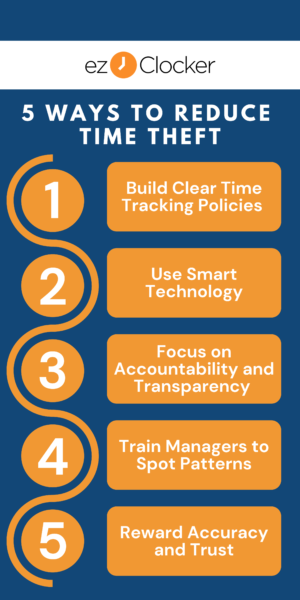Time theft is a quiet problem that can cost small businesses thousands each year. It happens when someone is paid for time they did not actually work. Common examples include arriving late, leaving early, or having a co-worker clock in for them. Even small mistakes or habits like rounding up hours can distort payroll totals. When time records are inaccurate, payroll errors multiply, compliance suffers, and trust between staff and management weakens.
These issues can create real problems during audits or when filing taxes. Also, the wrong numbers on timesheets can mean overpayments or fines if labor laws are broken. At the same time, workers who follow the rules may lose faith if they see others getting away with extra paid hours. That mix of confusion and mistrust can lower morale.
Most owners try to fix this by keeping a closer watch over their team. Yet tight control often leads to frustration and lower morale. People feel more engaged when they are trusted to do the right thing. The best approach is to use clear rules, simple technology, and open communication to keep time tracking fair and honest.
Build Clear Time Tracking Policies Your Team Understands
Clear time tracking policies help everyone know what is expected. Define start and end times, explain break limits, and describe what to do if someone forgets to clock in or out. Keep the rules short and easy to follow. Post them in common areas or send reminders through company apps or email.
Many workers commit time theft by accident. They might not understand how to record travel time or lunch breaks correctly. Short training sessions can fix that. During onboarding, walk through the process step by step. Then review it again during meetings so it stays fresh.
Use Smart Technology Instead of Tight Oversight
Manual time sheets create problems that technology can solve. Handwritten notes get lost, and text messages cause confusion. Also, buddy punching is easy when there is no proof of location. Smart tracking apps help by recording exact times and places.
Tools such as ezClocker let your team clock in from their phones. When employees clock in or out using ezClocker, the app captures the GPS location of the employees. This ensures accountability and frees up your time to focus on your clients and business.
Arthur Jordan with A.J. Electric uses ezClocker to help manage time tracking. He likes the fact that the app can GPS stamp where employees are when they clock in and out. This made him feel comfortable knowing that his employees were being honest even when he wasn’t on site with them.
Connecting digital time tracking with payroll saves hours of data entry. It also limits mistakes. It is also important to know your state and federal laws regarding time tracking and record keeping
Need an Employee Time Tracking App?
Focus on Accountability and Transparency
Accountability grows when staff can see their own time records. Let workers review their hours before payday. It helps them correct errors early and builds trust between staff and managers.
Kara Hale with Hale Appliance Services found that ezClocker’s GPS function complemented the trackers Kara had installed in company vehicles. She was dismayed to discover time theft. “People are going to try and get more time, which is really disappointing,” Kara says. She has since built a trustworthy crew, all of whom find ezClocker a breeze to use.
Transparency helps everyone understand that accurate time tracking supports fair pay. When your team can see how the system works, they are more likely to use it correctly which prevents time theft.
Train Managers to Spot Patterns, Not People
Good managers look for patterns instead of pointing fingers. If one department always clocks out late, there might be a scheduling issue rather than dishonesty. Reviewing data helps uncover problems early without damaging relationships.
Train supervisors to use reports to identify trends, not individuals. This keeps morale strong and decisions fair. ezClocker’s built-in reports make it easy to spot missed breaks, overtime trends, or short shifts.
At the same time, teach managers to talk about accuracy as a shared goal. Remind them that their actions model what the team will follow. When leaders approach the topic calmly, staff stay open to feedback.

Reward Accuracy and Trust Over Fear
Positive feedback can build better performance than punishment. Recognize staff who track time well. Mention them during meetings or send a short thank-you note. Small actions show that honesty matters.
Over time, trust replaces fear. Teams that feel appreciated take more care with their time tracking. Consistency improves, and small mistakes drop off. Simple rewards like extra break time or public recognition show that accuracy pays off. When people see honesty celebrated, it spreads quickly.
How to Talk About Time Theft Without Conflict
Time theft can be awkward to discuss, but avoiding the topic makes it worse. The best talks focus on fairness, not fault. Start by explaining how accurate time tracking protects everyone’s pay and keeps payroll smooth. Emphasize that the goal is to make the system work for the whole team.
Invite staff to share what makes time tracking hard. They may face internet issues, unclear shift rules, or slow devices. By listening, you show that honesty goes both ways. In many cases, those conversations reveal simple fixes that save hours of work each week.
It also helps to separate mistakes from intentional theft. Forgetting to clock in after lunch is not the same as asking a friend to punch in early. Calm, respectful communication helps everyone learn from errors without tension.
The 10-80-10 Rule and How It Applies to Time Theft
Most teams follow the 10-80-10 rule of behavior. Ten percent always act correctly, ten percent may take advantage if they can, and eighty percent follow the tone set by leadership. Your policies should focus on that middle group. When systems are clear and transparent, most people will choose honesty.
The few who keep breaking rules become easier to identify through regular reviews. When action is fair and consistent, your team learns that accuracy matters to everyone.
How to Create a Culture of Honest Time Tracking
Culture is what shapes behavior when no one is watching. If your company values honesty, your team will too. Encourage workers to fix mistakes right away. Make it easy to report missed punches without fear.
Site Mix Concrete – Atlanta replaced handwritten logs with ezClocker and used GPS tracking for job sites. The owner, Dale Henderson, also likes the GPS function, which tells him which employees were clocking in and where they were doing it from. As much as Dale trusts his employees, he’s also realistic. “Obviously, the employer wants to pay the fair time and wage, and the employee would understandably enjoy more time than is allowed,” he says. “ezClocker is the check and balance that helps us all keep in line.”
You can also strengthen culture by connecting honesty with professional growth. Explain that reliable time tracking helps the company plan raises, bonuses, and staffing schedules more accurately. When your team sees that accurate data supports better decisions, they care more about the details. Encourage workers to give suggestions for improving the process, such as adding reminders or simplifying clock-in steps. In many cases, the best ideas come from those using the system every day. Listening to feedback makes staff feel included, and inclusion keeps your culture strong even when leadership changes.
How Time Theft Impacts Payroll Accuracy
Time theft doesn’t just inflate labor costs; it also leads to payroll mistakes and compliance risks. When hours are wrong, wage reports and tax filings can be inaccurate. That creates stress for owners and staff alike.
The U.S. Department of Labor (DOL) mandates that employers keep complete and accurate payroll records to ensure compliance with the Fair Labor Standards Act (FLSA). Using automated time tracking keeps data accurate and reduces errors that lead to costly corrections.
Accurate time data also builds confidence. Your staff know they are paid fairly, and you can run payroll without guesswork.
Build Systems That Reduce Errors Without Control
Micromanagement often means the system needs improvement. When policies, tools, and communication align, you can step back and let the process do the work.
Review your setup often. Use time tracking tools with GPS, mobile access, and punch reminders. Keep your policy short and visible. Reinforce honesty during meetings and praise accuracy when you see it. Add periodic audits to catch small problems before they grow.
The Takeaway: Prevent Time Theft Without Losing Trust
Controlling people does not stop time theft; collaboration does. You can protect your payroll and your culture by focusing on fairness and clear systems.
Tools like ezClocker help small businesses prevent time theft and stay accurate without constant supervision. GPS punches, audit trails, and simple exports to payroll make it easy for teams to stay accountable.
To learn how other small businesses manage time tracking successfully, visit the ezClocker case studies. With the right approach, you can protect profits, reduce stress, and build a culture of trust that lasts.




